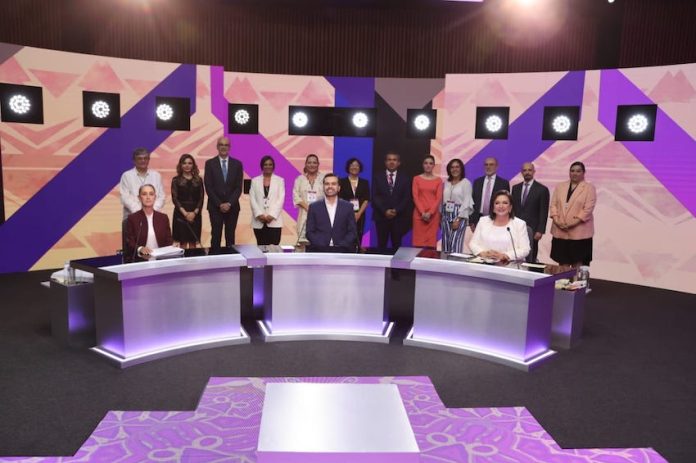Personal attacks rather than proposals for the future were the defining feature of Mexico’s first presidential debate of 2024, held exactly eight weeks before Mexicans go to the polls to elect a successor to President Andrés Manuel López Obrador (AMLO).
The two leading aspirants to the presidency, Claudia Sheinbaum of a coalition led by the ruling Morena party and Xóchitl Gálvez of a three-party opposition alliance, traded barbs during the two-hour debate in Mexico City on Sunday night, while the third candidate, Jorge Álvarez Máynez of the minor Citizens Movement (MC) party, went on the offensive against both women, and even took the opportunity to introduce himself to voters using sign language in one particularly memorable moment.
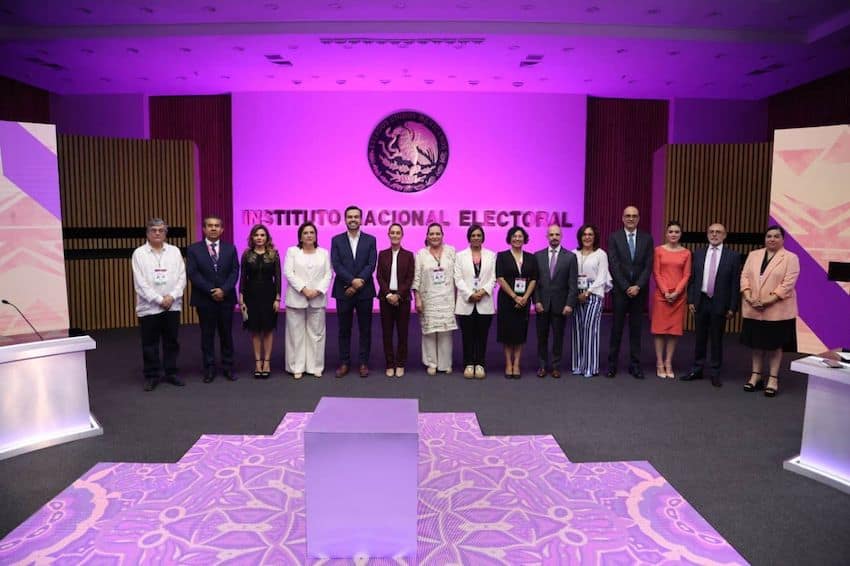
Moderated by two top journalists, the debate ostensibly focused on topics including education and health; the fight against corruption; and violence against women, but on several occasions, the candidates avoided or delayed responding to the questions put to them in favor of attacking their rivals.
After the debate, all three contenders claimed to have won, while many analysts concluded that Sheinbaum — the clear frontrunner in the race and a confident and calm debater —was the victor. In a “flash poll” conducted by the El País newspaper and W Radio, 46% of respondents declared that the Morena party candidate prevailed, while 25% said that Gálvez won and 10% concluded that Álvarez was the winner.
All three candidates on the attack
The three presidential hopefuls made a total of 59 “attacks” on their rivals, according to a count by the newspaper El Universal.
Sheinbaum, who leads the leftist “Let’s Keeping Making History” alliance made up of Morena, the Labor Party (PT) and the Green Party (PVEM), exclusively targeted Gálvez — a former senator and ex-mayor of the Mexico City borough of Miguel Hidalgo — accusing her of real estate-related corruption and of selling an apartment she pledged to donate to a Mexico City school.
The Morena candidate and former Mexico City mayor (2018-23) also took aim at the three parties that make up the Strength and Heart for Mexico opposition alliance, in particular, the National Action Party (PAN) and the Institutional Revolutionary Party (PRI), asserting that they want to return Mexico to its corrupt past, whereas she will continue the “transformation” initiated by AMLO, her political mentor.
“Today we have an honest president. You’ll never be able to say the same about the presidents of the PRIAN, which the candidate [Gálvez] represents,” said Sheinbaum, using a derogatory hybrid acronym for the PRI and the PAN.
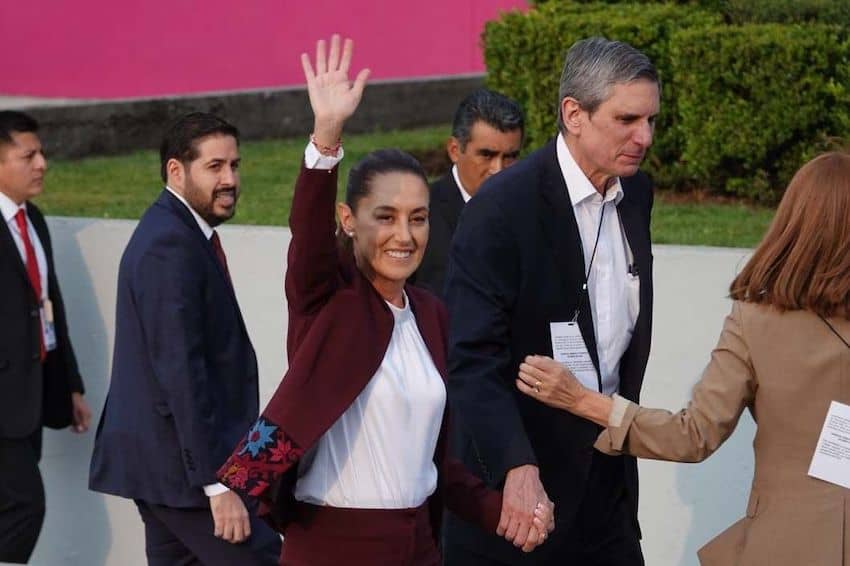
For her part, Gálvez, a computer engineer and businesswoman who has Indigenous Otomí ancestry, leveled a range of accusations at the Morena candidate, including that she was negligent in not shutting down a school in her borough before it collapsed in the 2017 earthquake, and that she is partially to blame for the fatal accident on Line 12 of the Mexico City metro in 2021.
“Claudia, you forgot to speak about the Rébsamen school. It’s unbelievable that due to your indifference, 19 children and seven adults died. A year before [the earthquake], Claudia, you had the evidence [necessary] to close that school, but you didn’t do it. I insist you’re a cold woman without a heart and that defines you completely,” said the PAN-PRI-PRD (Democratic Revolution Party) candidate, who also alleged that her rival has ignored the pleas of parents of children with cancer who have protested medicine shortages.
After highlighting that 26 people were also killed in the metro accident, Gálvez accused Sheinbaum of “criminal negligence,” noting that a private company determined that inadequate maintenance of Line 12 was one of the causes of the tragedy.
She also said she was prepared to take a polygraph test to demonstrate that corruption allegations made against her were untrue.
For her part, Shienbaum — who polls indicate is very likely to become Mexico’s first-ever female president — dismissed “everything the PRIAN candidate is saying” as “completely false.”
The Morena candidate, a physicist and environmental scientist, is aiming to use both her closeness to López Obrador, and her promise to perpetuate his political agenda, as an electoral asset. Early on in the debate, however, Gálvez remarked bluntly that “you are not AMLO” and declared that she can’t match the charisma of the current president, a loquacious nationalist and champion of the poor who has maintained high approval ratings throughout his 5 1/2 years in office.
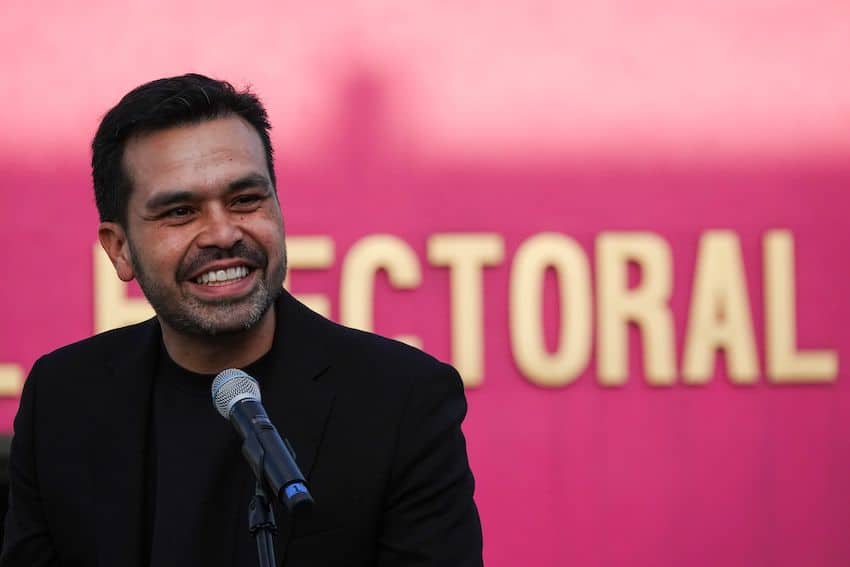
Gálvez also asked Sheinbaum whether a government she leads would investigate AMLO’s sons for alleged corruption. “If there is proof, it should be presented to the Attorney General’s Office,” shot back the Morena candidate.
Álvarez, meanwhile, attacked Sheinbaum for what he characterized as a poor record of governance in Mexico City, and asserted on repeated occasions that Gálvez represents “the old politics” of Mexico, referring to the scandal-prone PRI that governed the country for the majority of the 20th century and the PAN, which held office between 2000 and 2012.
The candidates’ visions for the future
When they weren’t criticizing each other, the three candidates did outline some of their plans as president should they win the June 2 election and succeed AMLO on Oct. 1.
Sheinbaum committed to providing scholarships for all public school students, while Gálvez said that a government she leads would offer financial support to attendees of private schools as well.
The PAN-PRI-PRD candidate also proposed increasing salaries for teachers and restarting the Full-Time Schools Program that was terminated by the current government. The program extended school hours for students at more than 25,000 schools and thus gave their parents — especially mothers — more time to work to support their families.
Álvarez, when speaking about his education plans, asserted that textbooks should not seek to indoctrinate students, as the current government has been accused of doing with texts published last year.
Concerning healthcare, Shienbaum pledged to strengthen the IMSS and ISSTE public health systems as well as IMSS Bienestar, the universal scheme created by the current government to offer care to people not registered via a formal employer.
Gálvez pledged to use technology to improve the healthcare system and put an end to medicine shortages that have plagued the current government. She also touted her plan to introduce a healthcare “smart card,” which would provide access to patients’ medical history among other information.
Sheinbaum, who was environment minister in the 2000-2005 Mexico City government led by AMLO, promised to continue the fight against corruption, which she asserted has generated huge savings over the past five years and thus allowed the current federal administration to allocate resources to major infrastructure projects and a range of welfare and social programs.
She also pledged to continue with the “republican austerity” doctrine of AMLO, who has cut public spending and eliminated what he describes as the unjust “privileges” enjoyed by officials in previous governments at the expense of the Mexican people.
In another memorable moment in the final minutes of the debate, Gálvez appeared to make a gaffe by holding a Mexican flag upside down as she declared she would defend the national symbol “from the corrupt [and] the criminals.”
“The Mexican flag will protect us all, it will protect us together, it will protect us in peace,” added the candidate.
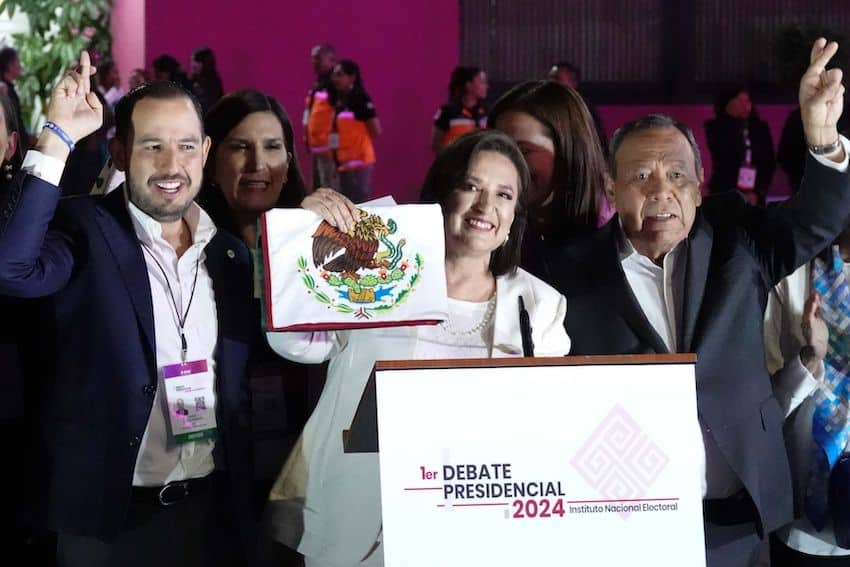
Gálvez subsequently said on social media that a citizen who displays the flag upside down is in fact protesting the violence and insecurity currently plaguing the country.
Maintaining a happy demeanor through much of the debate and frequently flashing a broad grin, Álvarez pledged to put “the girls and boys” of Mexico at “the center” of his government’s education strategy and to use artificial intelligence to inform healthcare decisions. The 38-year-old former lawmaker asserted that a “new” Mexico is possible under his leadership and pledged that an MC government would treat migrants more humanely.
“What we have done with the southern border is inhumane,” he said, referring to the use of the National Guard and the armed forces to detain migrants who have entered the country from Guatemala.
“The militarization hasn’t made our border more secure but it has made it crueler. That’s why we have to change the model for one of human rights,” Álvarez said.
He and the two women seeking to become Mexico’s next president will meet again for a second debate on April 28. In the meantime, Sheinbaum, Gálvez and Álvarez will return to the campaign trail as they seek to convince some 100 million eligible voters that they are the right person to lead Mexico for the next six years.
With reports from Milenio, Reforma, El Universal, El País and El Financiero
